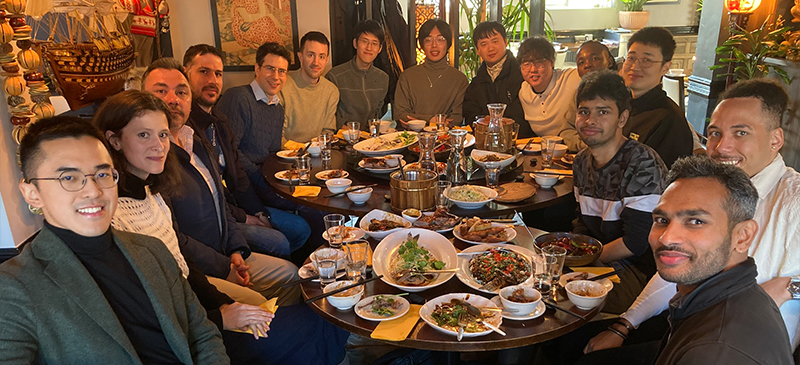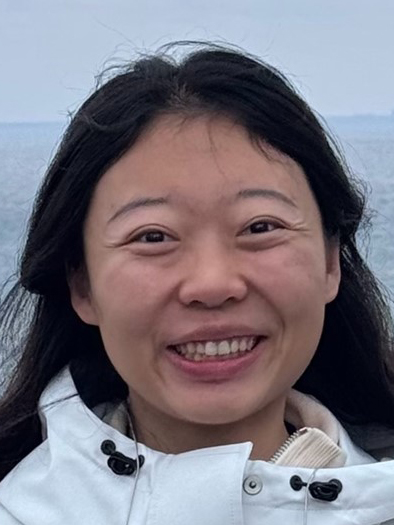
Principal Investigator

Prof. Michail Stamatakis
Michail is Professor of Computational Inorganic Chemistry at the University of Oxford (Inorganic Chemistry Lab), since September 2023. Prior to joining Oxford he was a member of Academic Staff (Lecturer, Associate Professor, and Professor) at the Department of Chemical Engineering at UCL. He conducted post-doctoral research at the University of Delaware (Newark, DE, USA) under the supervision of Prof. Dionisios G. Vlachos, after obtaining his PhD from Rice University (Houston, TX, USA), where he worked under Prof. Kyriacos Zygourakis and Dr Nikos Mantzaris. Michail also holds a Diploma in Chemical Engineering from the National Technical University of Athens (Greece), where he did his Diploma Thesis research under the advising of Prof. Andreas Boudouvis, as well as Dr Nikos Mantzaris in the context of two short placements to Rice University as a Visiting Scholar.
Full CV (opens pdf in new window) • Oxford Chemistry page • Google Scholar profile.
Post-Doctoral Researchers

Dr Yilun Gong
Yilun Gong completed his BEng and MEng in Materials Science and Engineering at Central South University (China) and the University of Birmingham (UK), followed by a DPhil in Materials at the University of Oxford. He subsequently held research positions in the UK and Germany before joining the group. His research focuses on the modelling of photo(electro)catalytic systems using mesoscopic reaction kinetics approaches, with emphasis on kinetic Monte Carlo method development, as part of the European project PREDICT, funded by the EIC.

Dr Miguel Pineda Rodriguez
Miguel obtained a B.Sc. in Physics from the University of Los Andes (Merida, Venezuela), and a PhD in Physical Chemistry at Leibniz University Hannover (Hannover, Germany). After his PhD, he worked as researcher in world leading interdisciplinary research institutions in Spain, Belgium, and UK, and as a Lecturer in Physics at Simon Bolivar University in Venezuela. He joined our lab for the first time in 2016 while at UCL, and he is currently working on method development, aiming at modelling reaction and diffusion phenomena on porous catalysts with kinetic Monte Carlo method, as part of a CBET-EPSRC project.

Dr Sai Sharath Yadavalli
Sai Sharath completed his Bachelor’s degree in Chemical Engineering from the National Institute of Technology Trichy, India in 2016. He subsequently worked as a Process Engineer at Dr. Reddy’s, a multinational pharmaceutical company, for about a year. In 2017, he got admitted at the University of Manchester to pursue an MSc in Advanced Chemical Engineering. His Master’s thesis involved molecular dynamics simulations to compute the diffusivity of H2S gas in liquid benzene at oil reservoir conditions. He joined the lab for the first time in 2018 while at UCL, and completed his PhD studies in December 2023, after which he joined the lab at Oxford. His work aims at understanding the coking thermodynamics and intrinsic chemistry of methane steam reforming on Ni via kinetic modelling.
Graduate Students

Aoyang (Lay) Liu
Aoyang obtained his BSc in Chemistry from the University of Nottingham in June 2024, having spent his first two years in their campus in China, and the final two years in the UK campus. During his summer vacation in 2023, he worked in the Glyco-science Lab in the Shanghai Institute of Materia Medica for two months and focused on analysing structures of polysaccharides. In 2025, he started his course in the IMAT CDT as a DPhil student under the supervision of both Prof. Michail Stamatakis and Prof. Kylie Vincent. His project is about study the mechanisms of metal-free catalysis by both experimental and computational methods (DFT and kinetic Monte Carlo).

Yuhong Luo
Yuhong completed his undergraduate studies at Hebei University of Technology in 2023, graduating with a first-class honours degree. He then joined the lab as a PhD student in 2024. His work focuses on using density functional theory calculations and kinetic Monte Carlo simulations to guide the synthesis of catalytic materials and to investigate the dynamics of catalytic behaviour and complex reaction pathways.

Alec Elias Sigurðarson
Alec completed his BSc in Chemistry in 2021 and his MSc in 2023 at the University of Iceland, under the supervision of Prof. Hannes Jónsson, graduating with a first-class honour degree. He joined the group as a PhD student in 2024, focusing on developing and improving computational methodologies based on the kinetic Monte Carlo (KMC) method for the simulation of complex reaction kinetics on solid surfaces, with a particular focus on photo(electro)-catalysts.

Jiawei Xu
Jiawei completed his undergraduate studies in Nanjing Normal University, China, 2021. Then he moved to Fujian Institute of Research on the Structure of Matter, Chinese Academy of Sciences, and completed an MSc in Physical Chemistry in 2024. In the same year, he started his D.Phil. under the joint supervision of Prof. John McGrady and Prof. Michail Stamatakis. His current work focuses on understanding reaction processes by utilizing high-accuracy electronic structure methods.

Geofrey Njovu
For his undergraduate studies, Geofrey attended the University of Edinburgh where he graduated with First Class Honours in Chemistry in 2022. His PhD at Oxford is jointly supervised by Prof. Bill David and Prof. Michail Stamatakis. His research seeks to employ computational and experimental methods to discover and develop high-performance ammonia synthesis catalysts that are commensurate with the intermittent supply of renewable energy.
His work experience includes stints in capital raising for renewable energy startups and an R&D internship at Johnson Matthey. Geofrey currently works as a research analyst at the Ammonia Energy Association where he tracks technology, finance and policy developments in the burgeoning ‘ammonia-as-an-energy-vector’ industry.

Mingyu (Marvin) Luo
Marvin completed his undergraduate studies at the University of Waterloo, Canada, in 2022. He then moved to Imperial College London, and completed an MSc in Materials Science in 2023. In the same year, he started his D.Phil. under the joint supervision of Prof. Edman Tsang and Prof. Michail Stamatakis. His current work focuses on the catalytic pathways of ammonia decomposition in the bulk of Dion-Jacobson perovskites and electrides, using DFT, molecular dynamic simulations and the quasi-harmonic approximation (QHA) method.

Zeyu Wu
Zeyu completed his undergraduate and master’s studies at University College London in 2022, graduating with a first class honour degree. He then joined the lab as a PhD student in 2022. His work focuses on developing and using predictive modelling approaches (quantum chemistry calculations and kinetic Monte Carlo simulations) to guide the development of catalytic materials and processes that prevent deactivation via poisoning.

Weitian Li
Weitian completed his undergraduate studies at the Beijing University of Chemical Technology, China, in 2019. He subsequently obtained an MSc in Materials for Energy and Environment at University College London in 2020, before joining the lab in the same year as a PhD student. His work focuses on the catalytic pathways of biomass conversion to fuels and chemicals on single atom alloy catalysts, and adopts quantum chemistry and statistical mechanics methods.
Affiliated and Visiting Researchers

Dr Rui (Ray) Liu
Rui completed her undergraduate studies at the School of Computer Science, Central South University (China) in 2019, graduating with first-class honours and receiving recognition as an Excellent Graduate. She pursued her PhD under the joint supervision of Prof. Xi Chen at the College of Control Science and Engineering, Zhejiang University (China), and Prof. Antonios Armaou at the Department of Chemical Engineering, University of Patras (Greece). Her doctoral research focused on kinetic Monte Carlo (KMC) simulations and acceleration of modelling approaches for polymerisation processes, and she successfully defended her thesis in 2024. She subsequently joined the Institute of Industrial Intelligence and Systems Engineering at Zhejiang University as a research assistant. She joined the lab in March 2025, and she is currently working on modelling polymer upcycling processes with the KMC method, with a broader goal of addressing challenges in plastic waste valorisation.